
International commercial contracts exist at the intersection of party autonomy and the applicable law. Whether these contracts can function as self-contained systems, uniformly interpreted regardless of the applicable law, requires consideration of their autonomous features and limitations.
Several characteristics suggest potential self-sufficiency in these agreements. International commercial contracts typically employ extensive, standardised language. Often, they include an arbitration clause, thus relying on a commercially oriented dispute resolution mechanism that to a large extent operates independently from national legal systems. Furthermore, parties frequently incorporate choice of law provisions, with access to transnational soft law instruments that can supplement or guide interpretation of the contract.
Yet analysis from contract and arbitration practice, as well as from comparative law and private international law, reveal constraints on this autonomy. Despite standardization efforts, contract terms remain susceptible to divergent interpretations across legal traditions. Contract freedom encounters boundaries established by mandatory rules and public policy considerations. The transnational soft law sources that parties may refer to complement rather than replace applicable national law frameworks.
Additional limitations arise in the implementation of autonomy principles. Parties face restrictions in their ability to select the governing law. Arbitration, despite its flexible character, operates within a framework of national laws that govern recognition and enforcement. And the arbitration process itself does not guarantee uniform contract interpretation, as arbitrators bring diverse legal backgrounds and approaches to dispute resolution.
This tension between autonomy and applicable law reflects the reality of international commercial relationships—one that continues to evolve as global commerce and legal frameworks develop.
Featured books
International Commercial Contracts: Contract Terms, Applicable Law and Arbitration
2024

Any practising lawyer and student working with international commercial contracts faces standardised contracts and international arbitration as mechanisms for dispute settlement. Transnational rules may be applicable, but national law is still important. Based on extensive practical experience, this book analyses international contract practice and its interaction with various applicable sources. It considers vital questions concerning the role played by contractual regulation, by national law and by transnational sources. What is the interaction among these factors, and how does this all apply to contracts that refer disputes to international arbitration? This revised second edition has been fully updated to reflect developments in the field and includes useful tools like tables of cases and sources, and a list of electronic resources and databases.
Applicable Law Issues in International Arbitration
2023

Determining the applicable law in arbitration is a manifold task that needs to balance the involved interests, which are not necessarily always consistent with each other. The uncontroversial starting point is the primacy of party autonomy. Important also is the arbitral tribunal’s discretion. Party autonomy and arbitral discretion, however, are not absolute, and do not exist in a vacuum: arbitral awards are subject to (a restricted) court control. To be valid and enforceable, arbitral awards need to comply with (few) requirements. The selection of the law applicable to any given issue reflects this plurality of interests, and is the result of balancing the parties’ expectations against court control and the arbitral tribunal’s independent powers, all this in the safeguard of predictability, consistency and legitimacy.
Internasjonal privatrett 2. utgave
2021
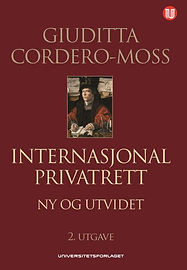
Den internasjonale privatretten gir regler om valg av domstol og valg av bakgrunnsrett når et privatrettslig rettsforhold har internasjonal karakter. Denne boken er en ny og utvidet utgave av boken som kom ut i 2014. Den første utgaven fremhevet konturene av en moderne tilnærming til internasjonalprivatrettslige spørsmål, som var i ferd med å vokse frem. I de senere år har Høyesterett avsagt flere avgjørelser som har bekreftet denne utviklingen. Denne nye utgaven drøfter ny rettspraksis og dens betydning for den tradisjonelle tilnærmingen. Den nye utgaven drøfter de nye norske og internasjonale kildene på området, blant annet et forslag til en lov om lovvalg på det formuerettslige området, som forfatteren skrev på oppdrag fra Justisdepartementet. I tillegg behandler boken den internasjonale familie-, arve- og personretten.
Norsk ordre public som skranke for partsautonomi i internasjonale kontrakter
2018

Formålet med denne boken er å konkretisere innholdet i ordre public på det forretningsjuridiske område etter norsk rett. Kommersielle partene kan ha illusjonen om at de eneste kilder som er relevante, er kontrakten selv og den valgte retten. Men det finnes begrensninger. Én av disse begrensinger er den såkalte ordre public-innsigelse. Innsigelsen begrenser norske domstolers rett og plikt til å anvende utenlandsk rett samt til å anerkjenne og tvangsfullbyrde utenlandske dommer og voldgiftsavgjørelser. Boken redegjør for de internasjonale og interne rammer og vilkår for å påberope seg ordre public. Deretter drøfter boken innsigelsen med utgangspunkt i ulike rettsområder som er relevante for kommersielle kontrakter: konkurranserett, selskapsrett, kreditorvern, kontraktsvilkår om ansvarsfraskrivelse, arbeidsrett og voldgiftsavtaler ved direkte krav.
Iura Novit Curia in International Arbitration
2018
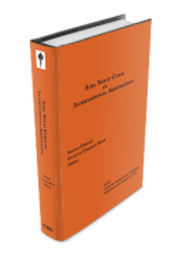
Iura Novit Curia in International Arbitration addresses a question that has attracted the attention of both scholars and practitioners for some time, namely that of whether arbitral tribunals may develop their own legal reasoning independently of the agreement and pleadings of the parties, something that may be looked upon as an oxymoron, given that arbitration itself is considered to be nothing but the result of manifestations of party autonomy – at least according to mainstream understanding of arbitration. The national reports included in this book, all drafted by distinguished academics and practitioners, are based on a questionnaire that can be found following this collection. The book also includes a general report, as well as a chapter by Friedrich Rosenfeld assessing how the principle iura novit curia is dealt with in international law.
International Commercial Arbitration. Different Forms and their Features
2013

Arbitration clauses in international commercial contracts are often reused from existing contracts. By so doing, the parties choose to apply either ad hoc or institutional arbitration and the UNCITRAL, ICC, LCIA, SCC, Swiss or other arbitration rules without necessarily being aware of the consequences. Parties often assume that an arbitration clause has the effect of excluding any kind of interference from a court of law and of rendering any but the chosen law redundant. This book highlights the specific features of various forms of arbitration and enables lawyers to make informed choices when drafting arbitration clauses. It explains the framework for arbitration, its relationship with national law, and the features of the main arbitration institutions in Europe, and highlights new trends in other parts of the world with repercussions on the theory of international arbitration.
International Commercial Arbitration. Party Autonomy and Mandatory Rules
1999

This book verifies to what extent the award of an international arbitral tribunal is effective if it has disregarded the mandatory rules of the national law that would have been applicable if the parties had not chosen another governing law. In addition to the New York Convention, the book analyses the systems of Norway, England, France, Italy, Sweden and Switzerland, as well as the UNCITRAL Model Law. With index.
Corporate Social Responsibility and the Transparency Act
2024
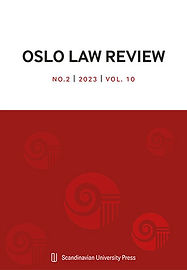
This special issue of Oslo Law Review collects some of the papers that were presented at a seminar I organised in Oslo on 9 September 2022 on the topic ʻCorporate Social Responsibility and the Transparency Act (Åpenhetsloven): The Norwegian and International Perspectivesʼ. Corporate social responsibility is an area that is rapidly gaining attention. The issue of companiesʼ accountability for the whole value chain is raised with increased frequency, particularly as far as concerns violation of human rights, labour- or environmental law incurred abroad by subsidiaries or suppliers. The issue can be looked at from different perspectives. Depending on whether it is framed as an issue of public law or of company law, or as a matter of civil liability, the legal effects will vary.
Independence and Impartiality of International Adjudicators
2023

The book collates special reports which address the topical issues currently under debate, such as the need to preserve the adjudicator’s independence from the other powers of the state, and the need to preserve the legitimacy of arbitration in investor-state disputes. Rapporteurs also examine topics such as the standard required for independence and impartiality, the selection criteria and the selection method, the authority in charge of making the selection (a party appointment or an appointing authority), the mechanisms to counter-balance the influence that may be exercised by the appointing authority, the adjudicator’s duty of disclosure, the adjudicator’s immunity, the adjudicator’s rights and duty after the term of service, codes of conduct, and the consequences of a breach of the different duties.
Towards a Norwegian Codification of Choice-of-Law Rules
2019
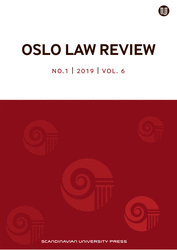
Rules on the applicable law, also known as conflict rules or choice-of-law rules, are part of that branch of the law that goes under the name of Private International Law. They are rules that permit the identification of which law governs a certain legal relationship when the relationship has international elements. If a Norwegian party purchases some goods from Germany, for example, these rules determine whether the sale is governed by Norwegian or by German law. If a Greek ship causes environmental damage off the coast of Norway, they determine whether the liability is subject to Greek or Norwegian law. Conflict rules are, in brief, provisions that permit the determination of which law is applicable. This issue of Oslo Law Review publishes some of the papers that were presented at a conference I organised at the University of Oslo on May 3rd and 4th, 2018.
Utredning om formuerettslige lovvalgsregler
2018

I brev 4. april 2017 anmodet Justis- og beredskapsdepartementet undertegnede om å utrede behovet for å lovfeste regler om lovvalg for forpliktelser i og utenfor kontrakt, samt vurdere behovet for å tilpasse reglene til løsningene i Roma I- og Roma II-forordningen. Jeg forstår mandatet slik at jeg skal vurdere lovvalgsregler for forpliktelser i og utenfor kontrakt ved å ta utgangspunkt i anvendelsesområdet til Roma I og Roma II. Lovvalgsregler for formuerettslige spørsmål som faller utenfor disse forordningenes anvendelsesområde, som for eksempel rettslig handleevne og fullmakt, vil derfor ikke bli foreslått. Videre vil jeg ikke foreslå lovvalgsregler for rettsområder som selskapsrett og tingsrett, som faller utenfor kontraktsretten og erstatningsretten.
Limitations on Party Autonomy in International Commercial Arbitration
2015

This course examines the limitations of party autonomy in international commercial arbitration, as parties have a central role in commercial arbitration. A “closed circuit” made only of the rules the parties agreed on is not always possible, and other sources can impact the arbitration, thus the autonomy of the parties. External restrictions exist due to the court’s power over arbitral awards. Internal limits to party autonomy exist, such as in the relation between the international contract and national law, as well as governing law and the interpretation of contract terms. The last part of this course aims to explain how international arbitration can escape these limits and to what extent international commercial is, or not, exempt from national laws. All these reflections lead to the conclusion that the party autonomy is not as large as one could think in international arbitration.
Boilerplate Clauses, International Commercial Contracts and the Applicable Law
2011
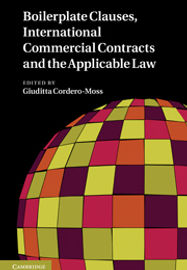
With the aim of creating an autonomous regime for the interpretation and application of the contract, boilerplate clauses are often inserted into international commercial contracts without negotiations or regard for their legal effects. The assumption that a sufficiently detailed and clear language will ensure that the legal effects of the contract will only be based on the contract, as opposed to the applicable law, was originally encouraged by English courts, and today most international contracts have these clauses, irrespective of the governing law. This collection of essays demonstrates that this assumption is not fully applicable under systems of civil law, because these systems are based on principles, such as good faith and loyalty, which contradict this approach.
Party Autonomy in the Practice of International Commercial Arbitration
19996

This book, published in 1996 by the Institute of State and Law (Moscow), Russian Academy of Sciences, is the PhD thesis that Cordero-Moss wrote under the supervision of professor A.A. Rubanov, and that was defended in 1995 at the Institute of State and Law. It analyses the limitations to party autonomy in international commercial arbitration.